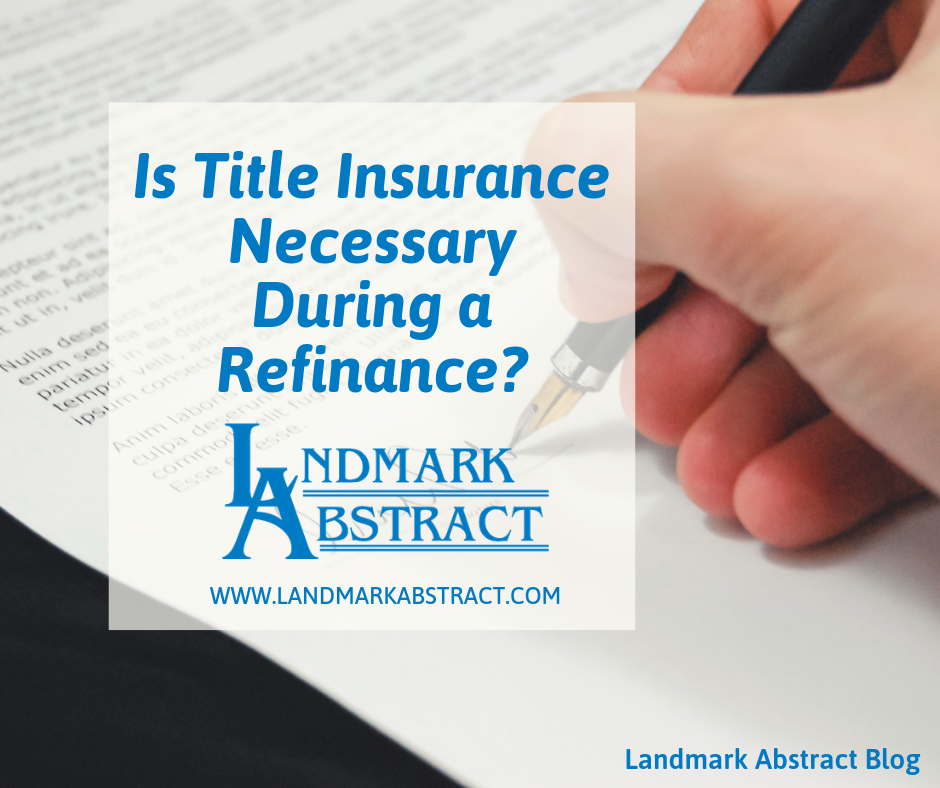Estimated reading time: 4 minutes
Is Title Insurance Necessary During a Refinance?

Is title insurance needed to refinance your mortgage? That’s a good question. Homeowners want to refinance their mortgage for different reasons. For example, people want to take advantage of a lower interest rate, eliminate Private Mortgage Insurance (PMI) or to cash out a portion of their home’s equity. Be sure! Title insurance is still needed for refinancing. No matter what the reason you are looking to refinance it is important to know that your lender will still likely require you to purchase a lender’s policy of title insurance and it is still important to protect your own interests by obtaining an owner’s policy of title insurance.
Title Insurance: A Review
Just what is title insurance? You can visit our various other blog posts to learn about how important title insurance is for homebuyers. One reason that people do not always understand this industry is that title insurance differs from many other types of insurance.
When you purchase car insurance or health insurance, you’re protecting yourself from a possible future negative event, like an accident or health problem. Car insurance requires the continuous payment of a premium to maintain coverage on the car, just as health insurance requires ongoing payment of a premium to protect against health issues.
Title insurance is different. When purchasing title insurance, you pay a one-time fee at settlement for your title insurance policy. Compared to most other types of insurance, a title insurance policy is significantly less expensive. A title insurance policy protects your investment, from undiscovered events in the past that may arise in the future and that could have a negative impact on your property ownership.
The title of your property is your proof of proper, legal ownership. Your home will likely be one of the largest and most significant purchases you will ever make. Title insurance ensures that you have clear and outright ownership claim to your property.
There are two types of policies, the lender’s policy and the owner’s policy. A Lender’s policy is required by your lender and only protects the lender’s interests in your property and only for the amount of the loan. An Owner’s Policy protects your interest in the property against any problems affecting the ownership of your property.
Why Is Title Insurance Necessary During a Refinance?
Title insurance protects a property investment no matter if it’s new construction, a property resale, or during a refinance transaction. Every time a property changes hands, a new owner’s policy can be purchased to protect the new owner’s investment, but for transactions where a lender is involved, a title insurance lender’s policy is almost always required.
If you weren’t anticipating buying a new title insurance policy during refinancing, you’re not alone. Many homeowners are surprised by this requirement. That may have to do with common misunderstandings about what a home refinance is and isn’t. A refinance loan isn’t simply a revision to your initial loan agreement of either for a lower rate or different mortgage payment.
When you refinance your home, the original loan is paid off and a new refinance loan is originated. When the original loan is paid off, the original title insurance lender’s policy goes with it. Without a new policy, the lender processing a refinance could be exposed to significant risk.
What About My Owner’s Policy?
Here’s the good news: If you purchased a title insurance owner’s policy when you bought your home, that policy will remain in effect before, during, and after your refinance. These types of title insurance policies stay in force for as long as you or your heirs own the property. Unlike a lender’s policy, your own title owner’s policy doesn’t just cover the value of your loan, it covers your whole investment in the property. So in case, a title search doesn’t turn up deed errors or omissions, examining records mistakes, forgeries, the existence of undisclosed heirs, or other problems, your owner’s policy will still protect your property investment against these and other issues for as long as you own it.
Learn about the difference between an Enhanced Vs. Standard Title Insurance Policy
Conclusion
While you may not have anticipated the added cost of a title insurance lender’s policy when you decided to refinance, the purchase is a necessary requirement in order to complete your refinance. Refinance loans are new loans that require a new title insurance policy to protect the lender. Considering the significant amount of risk that would be assumed without a title insurance policy, the actual cost is significantly lower than you might expect.
Learn More:


Leave a Reply
You must be logged in to post a comment.